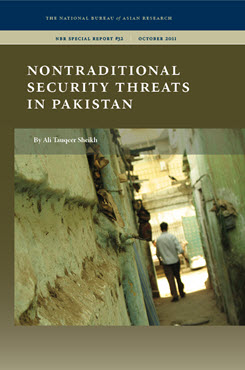NBR Special Report no. 32
Nontraditional Security Threats in Pakistan
This essay examines Pakistan’s most significant nontraditional security challenges, including climate change, increasing population and urbanization, food security, and water security.
EXECUTIVE SUMMARY
MAIN FINDINGS
- Climate change will negatively affect human activities and livelihoods in Pakistan through increasingly frequent extreme weather events and changes in temperature and precipitation. A rise in extreme weather has already led to an alarming increase in the number of people killed, injured, or made homeless.
- Pakistan’s large population and high growth rate adversely affect all aspects of society, the economy, and the environment. Population growth creates and exacerbates vulnerabilities by endangering basic civic amenities, leading to a lack of clean water and space for housing and ultimately burdening society.
- Growth in agricultural productivity has broadly kept pace with accelerating demand. However, medium‑term food security challenges will become far more daunting if immediate attention is not paid to managing water resources, both underground and in the Indus Basin river system.
- Water security is the most serious challenge for Pakistan due to several factors, particularly the increasing pressure of population and urbanization, massive expansion of tube‑well irrigation, reduced levels of precipitation caused by climate change, and the accelerated retreat of Himalayan glaciers.
POLICY IMPLICATIONS
- Pakistan can mitigate the adverse effects of natural disasters through early warning systems, technological advances in building and infrastructure construction, improved sanitation systems, increased disaster preparedness, and an organized health sector response.
- Expanding and enhancing the information and knowledge base on climate change, as well as mapping vulnerabilities, trends in internal migration, and the incidence of disease, can help create adaptive measures for reducing the effects of climate change.
- The successful implementation of mechanisms to address nontraditional security issues will require that South Asian countries work together to adopt ecosystem‑wide approaches that incorporate transboundary strategies.



